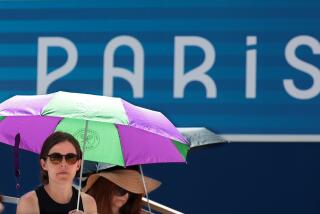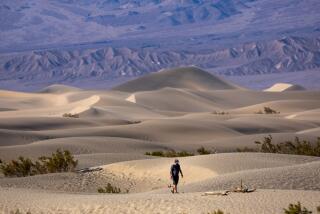Action Heats Up in Australian Open : Tennis: Temperatures up to 127 degrees leave players wobbling out of matches and fans fainting in their seats.
- Share via
MELBOURNE, Australia — The Australian Open turned into a colossal steambath Monday--courts sizzling at 127 degrees, players wobbling out of matches, fans fainting in their seats.
Medics treated about 20 fans of all ages who passed out in the heat, and several who suffered other symptoms of heatstroke.
Jim Courier delighted in the weather, dancing lightly in conditions that reminded him of home in Florida, complete with the same kind of lung-scalding breezes that buffet the courts where he honed his game.
Courier, seeded second, pounded shots as hard as ever to beat Marc Rosset, 6-3, 6-1, 6-3, and reach his fourth consecutive Grand Slam quarterfinal. The goal now: a match against John McEnroe.
“Absolutely,” Courier said. “That’d mean I’m in the final. I’d love to play him.”
Courier beat McEnroe in a tuneup tournament in Adelaide, but was more impressed with him during practice.
“He was taking my first serve early and coming in and playing well,” Courier said. “He didn’t do that when we played in our match. But I could see that he had pretty good feel with the balls.”
McEnroe showed he also can handle hot weather when he won his five-setter Sunday against Emilio Sanchez in 124-degree courtside temperatures. Top-seeded Stefan Edberg called McEnroe “Mr. Open,” just as the Swede described Jimmy Connors at the U.S. Open last summer.
While Courier escaped to the air-conditioned comfort of the player’s lounge after beating Rosset, a fellow American suffered in the heat.
Aaron Krickstein, a Michigan man with a reputation as one of the game’s great marathoners, felt nauseous and woozy in the fifth set against Amos Mansdorf and retired 6-2, 4-6, 1-6, 7-6 (7-4), 4-1.
Krickstein, who was fine a short while later, said he had diarrhea before the match and began feeling stomach pains during the fourth set.
“The heat sure didn’t help,” he said. “It was definitely the hottest day I’ve played since I’ve been here. I wasn’t tired. It may have looked like it, but I actually felt OK. It was just tough to stand up out there.”
Mansdorf, a former Israeli soldier used to desert heat, drank his way out of trouble.
“I felt very tired in the middle of the second set,” said Mansdorf, who next meets Courier. “I felt like I was getting sunstroke, so I just made sure that I kept drinking a lot.
“I drank so much that I couldn’t play, and I lost the third set 6-1 because I was so heavy. But then it paid off, because he was very tired at the end.”
Michael Stich quenched his thirst early, then pushed sluggishly past Wally Masur, the last Australian left in the men’s or women’s singles, 3-6, 6-4, 7-6 (7-5), 6-4. Stich next meets Richard Krajicek, a 7-5, 7-6 (8-6), 6-3 winner over Christian Bergstrom.
Some fans suffered more than the players.
“We treated about 25 heat-related injuries,” said Wayne Deakes, duty officer for St. John Ambulance at the National Tennis Center. “Most of them fainted or felt faint. It was purely from the heat.”
Courier acknowledged that he seems to have a talent for slipping quietly through a tournament, handling pressure as coolly as he does the heat.
“Maybe I do unconsciously,” he said. “I’m happy just to keep playing, and to let the others grab the attention and let me slip through.”
Asked whether he envied the drama of an 8-6 fifth set, like McEnroe’s over Sanchez, Courier patted his thighs and responded: “No, my legs aren’t envious of that at all. They’re very happy to sneak through in straight sets.”
It’s not that he minds attention, he said, but rather that he feels no need for fame.
“I’m not an icon like Andre is,” Courier said. “Everyone in America knows who he is because of his commercials. I don’t have any commercials, so the non-tennis public has no idea who I am, which is fine with me.
“I like to be able to go to the mall, a movie or a restaurant, and not be bothered. I don’t want to have to be looking at myself in the mirror all the time because people are always looking at me to see what I’m doing. There’s less pressure this way.”
Reminded that Agassi and others make plenty of money making commercials, Courier said, “You can make a lot of money winning tennis matches, too.”
More to Read
Go beyond the scoreboard
Get the latest on L.A.'s teams in the daily Sports Report newsletter.
You may occasionally receive promotional content from the Los Angeles Times.










